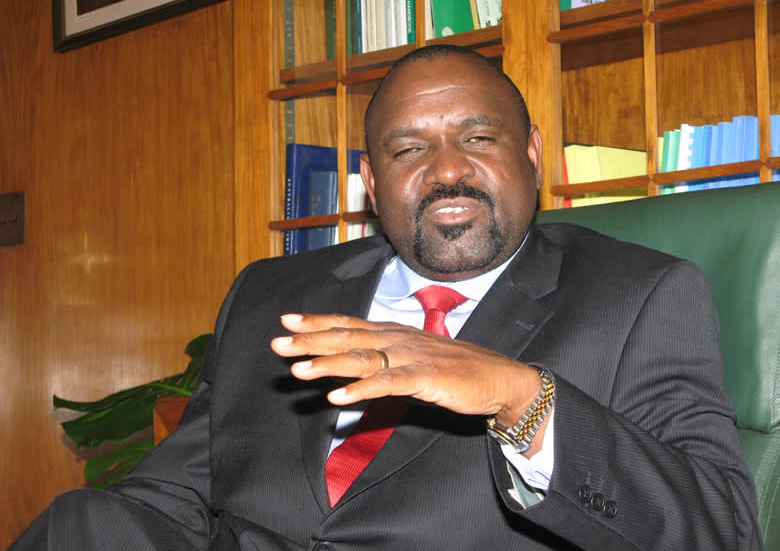ZIMBABWE will hold 28 parliamentary by-elections on March 26 this year and next year will have the much-awaited harmonised general elections. The country’s opposition is disjointed ahead of both elections with political analysts predicting President Emmerson Mnangagwa and his ruling Zanu PF party would easily achieve victory.
The Daily News on Sunday’s Southern Editor Jeffrey Muvundusi last week had a chat with former national chairperson of the MDC and now president of United Movement for Devolution (UMD) Lovemore Moyo on political developments in the country, the state of the opposition and its readiness for elections.
Below are excerpts of the interview.
Q: Give us your recap of the year 2021 politically and economically?
A: Zimbabwe continued to experience an unprecedented deepening economic crisis despite the fact that the government introduced a series of mitigation measures designed to curb inflation hoping to stabilize the economy. The alleged injection of capital into industry, commerce, medium and small businesses failed to stimulate the economy growth and stability. Zimbabwe as a country continues to be a consumer economy with very little happening in the manufacturing industry and mining sector.
What we have seen in the year 2021 is an increase of mining-related violence and death caused by clashes that are related to the mining territorial disputes. Mining sector has become an unsafe industry as warlords who are connected to senior Zanu PF and government officials reign supreme. Again, the continued partisan, looting and corruption around allocation of mining claims which are largely used to mobilize support from unsuspecting potential entrepreneurs.
Unfortunately, the widespread informal extraction of minerals has not substantially benefited the national coffers as most of the proceeds are sold in the black market by passing the formal avenues. Also, the year 2021 witnessed an increase of Chinese companies in our economy taking over most mega deals though under dubious and corrupt circumstances.
Loss of sources of income and livelihoods was prevalent in the last year and continued affecting many families. The discovery of the Covid-19 pandemic further exacerbated the hunger and poverty situation as the government ordered the closure of businesses and controlled movements of the people in order to curb the spread of the disease.
Very little political activity was noticed largely because of the Covid-19 restrictive measures imposed by the government. So brazenly shocking was the absence of opposition politics in the political landscape as Zanu PF dominated local politics especially in Parliament and local government councils. Surprisingly, what has dominated opposition politics was massive infighting instead of confronting head on Zanu PF government’s misrule.
Q: What are your prospects for the New Year?
A: It’s extremely difficult to view the year 2022 in isolation from the previous year 2021 given that we are still operating under the same political, social and economic conditions we endured last year. Given the continued presence of Covid-19 disease in our midst and restrictive measures imposed by the government will make it difficult for the opposition political parties to canvass for political support freely. However, we remain optimistic that the political environment will change for the better to allow all political parties to mobilise without any hindrance.
Q: As UMD, what are your plans this year, are you by any chance going to take part in by-elections and national elections?
A: UMD views 2022 as the year for political reconstruction and accelerating party growth through increased party activities. As a new political movement, we will be focusing on strengthening our ideological values and principles of devolution. Therefore, political education and ideological indoctrination is of paramount importance and will dominate the bulk of our political programmes and activities.
We will intensify our presence in the provinces, districts, wards and villages focusing mainly on developing a politically-enlightened membership and support base. Further, we wish to launch our party policy framework and Manifesto by March 2022.
Our eyes are fixed on the harmonised parliamentary, presidential and council general elections which our elections department is firmly preparing for, both politically and technically. However, we are of the firm view that by-elections can be an unnecessary political distraction given the violent history of Zanu PF in the past by-elections though we acknowledge their constitutionality.
Q: What’s your take on the just-ended chaotic internal Zanu PF polls, are they a sign of how the 2023 elections will be?
A: Zanu PF is a chaotic political party which over the years has thrived on the application of political violence against its political opponents, members and supporters.
Therefore, it’s not at all surprising to note the extent of violence and brutality so far reported in their internal electoral processes. It’s clear that the psychology of Zanu PF is formed on the premise that violence and brutality are acceptable norms and standards in their party. In other words, it’s embedded in their DNA. In essence, we can never rule out similar past violent scenes and strategies to win power by all means necessary and at all cost.
Q: As opposition, do you have the stamina to dislodge Zanu PF in the next elections?
A: If properly organised and mobilised, under one umbrella of a coalition political vehicle, the opposition parties in their collective can wrestle political power away from Zanu PF in the 2023 plebiscite. In other words, the stamina can be built only when political players, churches and civil society congregate together in order to avoid a divided vote. Historically, Zanu PF has always retained state power though having won with a minority vote in a heavily divided majority.
Q: Is UMD involved in any talks among the opposition parties for a grand coalition ahead of the 2023 polls?
A: UMD has been involved in talks with other like-minded opposition parties for quite some time now though we haven’t made our dialogue public.
There’s collective understanding within opposition parties that a divided vote benefits the incumbent governing party. Therefore, it’s imperative that opposition political parties join forces together to form a grand coalition in order to contest the 2023 elections under one political vehicle.
Q: What is UMD doing to ensure the opposition does not divide the vote in 2023?
A: The UMD firmly believes in the unity of opposition parties, and supports the establishment of a grand coalition in order to avoid the splitting of votes in the 2023 general elections.
Q: Is Polad a political solution in Zimbabwe?
A: As I have alluded to before that Polad has no legitimate political status other than owing its existence to ED Mnangagwa. Therefore, Polad has no national appeal and endorsement as it’s composed of largely minority political groupings with small or no constituents at all.
In short, Polad lacks credibility and political relevance, therefore, it’s a liability to the state and unnecessary burden to the treasury. It’s clear that Zanu PF wants to use the grouping under Poland as a scapegoat for its imminent leadership and economic failures.
The political solution is for the government to practice good governance, accountability, democracy, human rights and adhere to international norms and standards of holding free, transparent and democratic elections.
Q: Do you see the push for dialogue by some sectors in Zimbabwe coming to a fruition anytime soon?
A: As I said, I am not a proponent of dialogue for the sake of equalisation by the ruling party. I argue that since Zanu PF claimed victory in the 2018 plebiscite, it must be allowed to govern independently in order to deliver the electoral campaign promises to the people. What’s of critical importance is for the relevant government institutions together with political parties and other stakeholders to begin to prepare for free, uncontested, inclusive and democratic elections laying the foundation for the 2023 general elections.
Q: Any other comments?
A: Our view is that Zimbabwe must by now be a strong and mature democracy and must be the leader in the Sadc region and beyond in adherence to democratic principles and values. Going forward, the UMD wants to see the role and use of the military forces drastically reduced in order to achieve free and democratic elections. The UMD wants to see the depoliticisation of all state institutions and organs of the state such that they maintain a neutral role in the running of elections.
In conclusion, the UMD would want to see the full implementation of Devolution of power in terms of Chapter 14 of the constitution of Zimbabwe. Finally, an ideal and most perfect Zimbabwe would be the one where equality and justice shall be observed regardless of one’s tribe, race, gender and social status.








